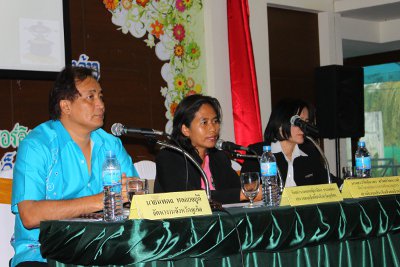Illegal Phuket migrant workers get five-month reprieve

PHUKET: More than 20,000 unregistered migrant workers in Phuket now have until mid-June to register with the government, thanks to a Cabinet resolution earlier this month extending the deadline by five months.
The extension gives employers time to obtain two-year work permits for unregistered alien workers from Burma, Laos and Cambodia, said Phuket Provincial Employment Office Chief Noppadol Ployudee.
Workers whose permits were set to expire on January 20 or February 28 now have until June 14 to extend them, but their employers need to request the new permits and submit documents to begin their employees national verification process by April 12.
Any workers who fail to complete the verification process by June 14 will not be allowed to work after that date, he said.
As an added incentive, alien workers who apply for permits and complete the verification process before June 15 will be eligible for 500-baht visas to re-enter the country, Mr Noppadol said.
After the deadline, the visa fee will return to the normal rate of 2,000 baht, he said.
Mr Noppadol explained the new deadline to employers at a meeting attended by about 60 people at the Phuket Merlin Hotel on Tuesday.
Topics covered at the meeting included other issues affecting employers hiring low-wage foreign workers, such as the social security services registered workers would be eligible to receive.
Attendees were told there are 10,700 employers in Phuket with a total of 62,183 alien workers in their employ. These break down as follows:
– 38,287 Holders of permits who have completed the verification process;
– 859 Holders of permits under a Memorandum of Understanding (MOU) between Thailand and their home countries;
– 2,479 Holders of existing permits who have yet to complete the verification process;
– 20,588 New applicants who must complete the verification process by June 14.
Mr Noppadol said the Thai government is now in discussions with Laos and Cambodia that would allow their nationals to work in Thailand under an MOU agreement, doing away with the need for national verification.
However, the date when formal talks on the issue would take place had yet to be announced, he said.
Mr Noppadol said there are now 72 companies in the country registered with the Ministry of Labor to act as agents to help the employers complete the complicated process of legalizing alien workers.
In addition, the Burmese government has set up verification centers in five more provinces: Chiang Mai, Samut Sakhon, Samut Prakan, Surat Thani and Bangkok.
In addition to the original three located in Ranong, Tak and Chiang Rai, this brings the national network to eight, he said.
Nationwide, more than a million workers from the three countries must complete verification by the June 14 deadline.
In Phuket, the vast majority of migrant workers are Burmese or people of other ethnicities whose homelands are controlled by the Burmese junta, including many ethnic Mons.
Many unregistered workers fear that providing data to the Myanmar government would lead to persecution of family members back home or other injustices.
Estimates of the number of Burmese workers living in Phuket have ranged as high as 200,000.
A report in the independent Democratic Voice of Burma last month cited a migrant advocacy group claims that the verification and work permit scheme backed by both the Thai and Burmese governments has done little to improve the lives of those who enrolled.
The report quoted Sein Htay, group coordinator of the Human Rights and Development Foundation, as saying that of the 700,000 workers registered so far, only 50,000 enjoyed the same welfare benefits as their Thai counterparts.
Under Thai law, the employer must cover 5% of the worker’s social security fund, but Sein Htay said that many employers were reluctant to pay the extra money.
“The rest have no labor privileges whatsoever,” he said.
“When using the previous migrant ID cards, they had been entitled to the 30 baht healthcare scheme introduced under former Thai prime minister Thaksin Shinawatra, but the registration process effectively canceled this privilege…
“In a way, they have become like the illegal migrant workers. Now they have to cover their own medical expenses and such,” the report quoted Sein Htay as charging.
“The current issue we are facing is that employers are refusing to take responsibility for their workers and denying them compensation [when injured at work]. And the workers can’t afford to sue their employers as court cases may take months or even years and there’s no guarantee that they would win the lawsuit,” he said.
— Atchaa Khamlo
Latest Thailand News
Follow The Thaiger on Google News:


























